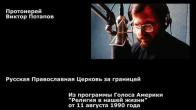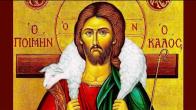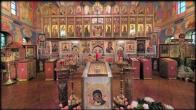You are here
St. Makarius, archimandrite of Kanev
7/20 September
St.Macarius of Kanev was born in 1605 in the ancient city of Ovrucha in Volynia, to the pious Tokarev family, famous Orthodox zealots. His parents instructed the child in the fear of God and in love for prayer and the church. Soon the young struggler, who "from his childhood loved Christ the Saviour" left his parents' home forever and in 1614 entered the Monastery of the Dormition of the Mother of God in Ovrucha. Prayer and reading the works of the Holy Fathers became the tonsured young monk's favorite activity. In 1625, bishop Abraham of Pinsk sent the monk Macarius to the Kupiatits Monastery in Pinsk. There the venerable one became so renowned for his struggles and his virtuous life, that soon (in 1630) he was ordained by bishop Lazarus (Baranovitch) to the rank of Hierodeacon, and 2 years later, to Hieromonk. In 1637, St. Macarius held the position of rector of the Kamenets Monastery of the Resurrection (Grodnensky Province). From 1656 to 1659, he was the rector of the Kupiatits Monastery in Pinsk. In 1660, as an Archimandrite, St. Macarius directed the brethren of the Monastery of the Dormition in his native Ovrucha. This was a difficult time for Orthodox Christians in Western Russia. Catholic Poland was attempting to force the Unia and Latinism [Roman Catholicism] upon the Orthodox populace. Uniates and Dominican monks often attacked the Saint's monastery, looting the church property, beating and insulting the brethren. But the God-pleaser Macarius did not lose heart, and encouraged the brethren with the hope of heavenly intervention. "Repeat, repeat more often the words of the Prophet David," he would say, "The Lord is my light and my Savior! Whom then shall I fear? If a battle shall be raised against me, in Him shall I hope…." (Psalm 26: 1-3). And the hearts of the monks were emboldened with firm faith and hope in the Most-powerful God.
In 1671, during an attack on the monastery, the Uniats tried to convince St. Macarius to join the Unia, but he courageously replied: "What dealings can we have with you? You have disregarded the Canons of the Ecumenical Councils, accepted the tradition of falsehood, and instead of being under the Head of the Church, Jesus Christ, have submitted yourselves to an earthly ruler - the Pope of Rome." Encouraged by the Jesuits, the enraged Poles sacked the city and the Monastery and drove out all the monks. St. Macarius went to the Kiev Caves Lavra; there he struggled for 2 years. However it was not only Kiev that was in need of such a zealous defender of Orthodoxy. Metropolitan Joseph (Neliubovitch-Tukalsky) of Kiev appointed Archimandrite Macarius as rector of the Kaneva Monastery. There the God-pleaser was renowned for many miracles and for the Grace-filled gift of clairvoyance. Many weary, poor, sick, and sorrowing people came to him in the Monastery, where they received spiritual counsel and healing. On one occasion, St Macarius healed a blind resident of the city of Kaneva. "Have faith and pray to Him, Who gave sight to the blind man," he said, "Go to the service of the eve of Theophany and pray." During the service, when the saint read the words from the prayer for the blessing of the waters: "Great art Thou o Lord, and marvelous are Thy works" the blind man saw a bright ray of light flash near his eyes, and suddenly he began to see. In gratitude to God, the healed one built a church in honor of Holy Theophany. On another well-known occasion, through good counsel and prayer, St Macarius turned a lazy and immoral son of a pious woman toward repentance. The Saint would say to the youth "Read one prayer - the 'Our Father" - and in it you will find everything: the light of knowledge of God, lessons for life, and comfort and strength for the soul. I think it is not difficult to read this prayer attentively." The youth liked this prayer so much, that he started to read it often, and soon he became an honest and virtuous man. Two years before his blessed repose, St. Macarius foretold the destruction of Kanev and his own martyric end. He tirelessly encouraged all to firmly and fearlessly confess the Holy Orthodox faith. The Saint would say, "One can receive the incorruptible crown by no other way, but by diligently completing one's spiritual struggle. Let the Orthodox not apostatize from their Holy Faith, but let them patiently strive toward their approaching struggles, unceasingly remembering the Lord Jesus." On September 4, 1678, the Turks and the Tatars attacked Kanev and broke into the Monastery. Holding the Cross, the Saint fearlessly met the barbarians on the porch of the church. The Tatars began to mercilessly beat him, demanding that he show them where the monastery's gold and property was hidden. "My gold is in heaven, and not on earth," the Holy Elder replied. The impious invaders began to beat him with sticks; they broke his arms and legs with steel implements and tore off his skin. But St. Macarius, calling upon the Sweetest Jesus, patiently endured the tortures. "Direct my feet on a peaceful path to You, O God!" he exclaimed, "for this is what my soul longs for and on it finds its end." In 1688, during the renovation of the monastery church, the Saint's tomb was opened; in it were found his incorrupt and sweet smelling remains. On May 13, 1688, the relics were triumphantly translated to the Pereyaslavl Church of the Resurrection. In 1713, the holy relics were translated to the Monastery of the Archangel Michael, and then in 1786 to the Monastery of the Ascension in Pereyaslavl. At the present time, the relics of the Ascetic martyr are in the Church of the Nativity of the Mother of God in the city of Cherkass. The memory of the Martyr Macarius is celebrated twice: September 7th - the day of his repose, and May 13th - the day of the translation of his holy relics.
PARISH LIFE
Address of our Cathedral
Subscribe to our mailing list
While all the materials on this site are copyrighted, you may use them freely as long as you treat them
with respect and provide attribution on the Russian Orthodox Cathedral of St.John the Baptist of Washington DC.









